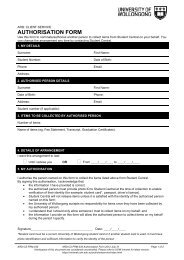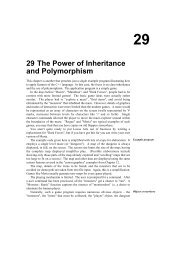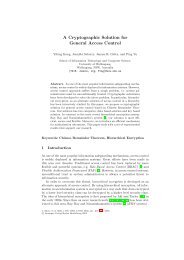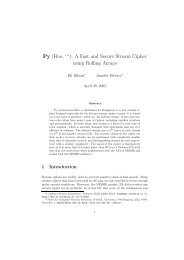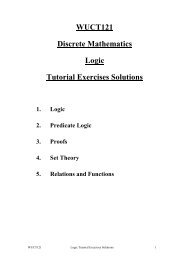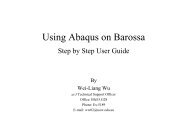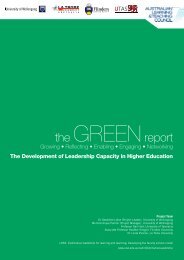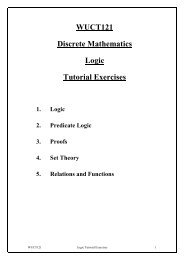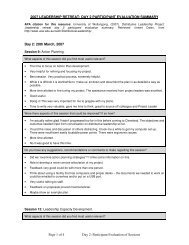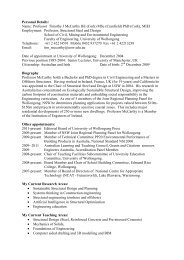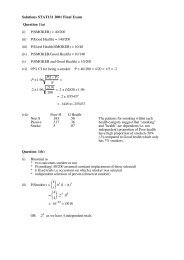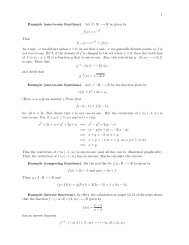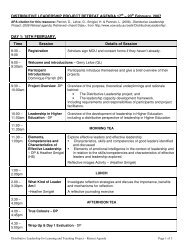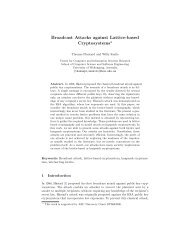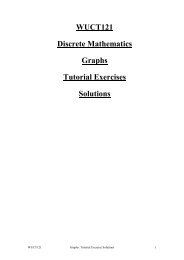india author m 1- a-nan - University of Wollongong
india author m 1- a-nan - University of Wollongong
india author m 1- a-nan - University of Wollongong
Create successful ePaper yourself
Turn your PDF publications into a flip-book with our unique Google optimized e-Paper software.
Criticism<br />
ABIDI, S.Z.H. Kamala Markandaya's 'Nectar in a Sieve' Bareilly: Prakash Book Depot,<br />
1977, 127 pp.<br />
ADKINS, J.F. "Kamala Markandaya: Indo-Anglian Conflict as Unity" Journal <strong>of</strong> South Asian<br />
Literature 10.1 (1974):89-102.<br />
AFZAL-KHAN, FAWZIA. "Genre and Ideology in the novels <strong>of</strong> Four contemporary Indo-<br />
Anglian novelists: R.K. Narayan, Anita Desai, Kamala Markandaya and Salman Rushdie"<br />
DAI 47.4 (October 1986):1328A.<br />
APPASWAMY, S. P. "The Golden Honeycomb: A Saga <strong>of</strong> Princely Life in India." JIWE<br />
6,no.2 (1978): 56-63.<br />
Mainly descriptive, with a paragraph analysing the linguistic style. The novel presents a<br />
more truthful picture <strong>of</strong> the Raj's dealings with princely India than A<strong>nan</strong>d's Private Life <strong>of</strong> an<br />
Indian Prince or Malgonkar's The Princes. Markandaya brings out the shrewdness <strong>of</strong> the<br />
British policy, which would give a prince the kind <strong>of</strong> education calculated to make him an<br />
English country gentleman, out <strong>of</strong> touch with the Indian reality. Events, such as the Delhi<br />
Durbar, are presented from a multiple point <strong>of</strong> view. Women did not have a place in public<br />
life, but their overpowering influence is presented well by Markandaya.<br />
ARGYLE, BARRY. "Kamala Markandaya's Nectar in a Sieve." Ariel 4, no.1 (1973): 35-45.<br />
Reprinted in The Literarv Half-Yearly 15, no.1 (1974): 73-84.<br />
Reading Nectar in a Sieve as a sociological document diverts attention from its<br />
organisation as a novel, the sensibility that informs it, and the moral intelligence that controls<br />
the sensibility, aspects which are brought out well in Argyle's close reading <strong>of</strong> the text. The<br />
fact that life is circular, not linear, controls the organisation <strong>of</strong> this story <strong>of</strong> a simple woman.<br />
The novel begins with Rukmani, the narrator, an old woman recalling her experiences <strong>of</strong> the<br />
night. Eighteen <strong>of</strong> the novel's thirty chapters contain in their first sentence a reference to time;<br />
in the first sentence <strong>of</strong> the other twelve chapters, there is a reference to journeys, that is,<br />
movement in time. Argyle pays great attention to the words on the page, and demonstrates<br />
how carefully crafted the novel is.<br />
AITHAL, S KRISHNAMOORTHY and RASHMI AITHAL. "East-West Encounter in Four<br />
Indo-English Novels." In Alien Voice: Perspectives on Commonwealth Literature, edited by<br />
Avadhesh K. Srivastava (Lucknow: Print House, 1981): 84-100. ACLALS Bulletin Sixth<br />
Series, no.1 (1982): 1-16.<br />
Examines the variety <strong>of</strong> treatment <strong>of</strong> the theme in Kamala Markandaya's Some Inner<br />
Fury (1955), Manohar Malgonkar's Combat <strong>of</strong> Shadows (1962), Raja Rao's The Serpent<br />
and the Rope (1960) and Anita Desai's Bye-Bve Blackbird (1971). In Some Inner Furv, the<br />
encounter is between a Hindu girl Mira and an Englishman in the nineteen-forties. Despite<br />
wide differences in race and culture, they love each other deeply, but are wrenched apart by<br />
political forces.<br />
AITHAL, S. K. "Indo-British Encounter in Kamala Markandaya's Novels." Journal <strong>of</strong> South<br />
Asian Literature 22, no.2 (1987): 49-59.<br />
Thematic study. Markandaya examines Indo-British encounter through various<br />
characters, situations, settings and points <strong>of</strong> view, people face insurmountable difficulties in



